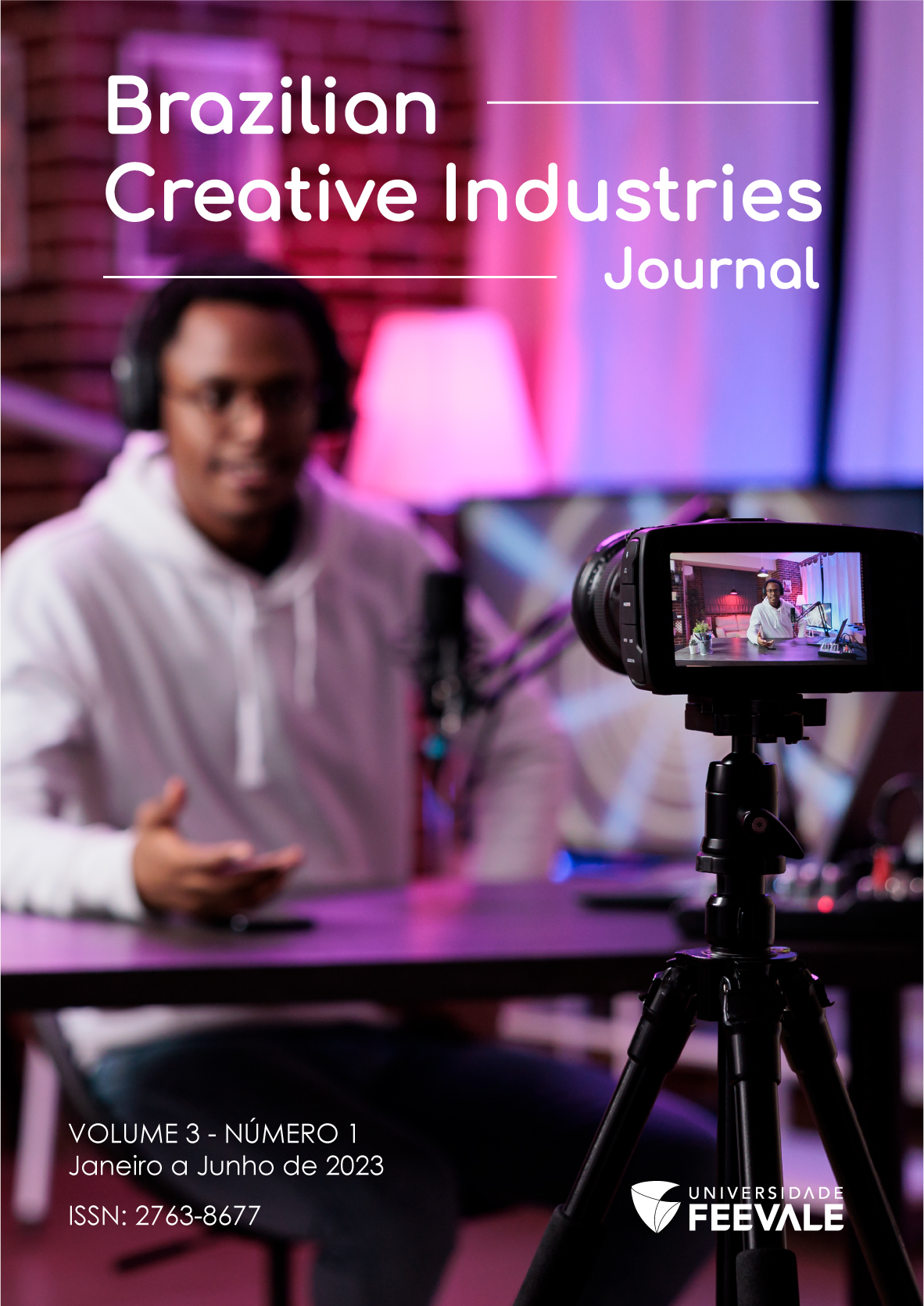ALÉM DO DIPLOMA: PAPEL DAS UNIVERSIDADES NA FORMAÇÃO DE PROFISSIONAIS CRIATIVOS – ESTUDO DE CASO MÚLTIPLO BRASIL-PORTUGAL
DOI:
https://doi.org/10.25112/bcij.v3i1.3317Palavras-chave:
Trabalhadores Criativos, Economia Criativa, Profissionalização, Educação SuperiorResumo
A despeito das poucas exigências de acreditação profissional e da (tentadora) vinculação do trabalho criativo à vocação, autoaprendizado ou talento, a literatura tem mostrado que a educação superior tem importante papel no desempenho da economia criativa. Sob esta perspectiva, objetiva-se evidenciar o papel da educação superior na profissionalização de trabalhadores criativos, a partir de um estudo comparado, nas cidades de São Paulo e Lisboa. Para tanto, foi realizado estudo de caso múltiplo envolvendo três instituições de ensino brasileiras e quatro portuguesas a partir dos argumentos que fundamentam o papel da educação superior no desenvolvimento do setor cultural e criativo: teoria da classe criativa, teoria dos clusters criativos, e, por fim, teoria sobre representação nacional e identidade cultural. Resultados permitiram descortinar treze principais características da educação superior no Brasil e Portugal, bem como o papel preponderante das universidades na formação de profissionais qualificados para uma profissão dinâmica, criativa e cada vez mais interconectada com demais profissões e necessidades de mercado.
Referências
BARDIN, L. Análise de Conteúdo. 3. ed. Lisboa: Edições 70, 2004.
BENNEWORTH, P.; DAUNCEY, H. Cultural policy, creative clusters and the complexity of higher education: notes from the case of Enjmin in Angoulême, France. International Journal of Cultural Policy, v. 22, n. 1, p. 80–99, 2016.
BRIDGSTOCK, R.; CUNNINGHAM, S. Creative labour and graduate outcomes: implications for higher education and cultural policy. International Journal of Cultural Policy, v. 22, n. 1, p. 10–26, 2016.
CASACUBERTA, C.; GANDELMAN, N. Multiple job holding: the artist’s labour supply approach. Applied Economics, v. 44, n. 3, p. 323–337, jan. 2012.
CHUNG, P. The creati ve industry of Singapore: Cultural policy in the age of globalisation. Media International Australia, v. 2015, n. 128, p. 31–45, 2008.
COMUNIAN, R.; OOI, C. S. Global aspirations and local talent: the development of creative higher education in Singapore. International Journal of Cultural Policy, v. 22, n. 1, p. 58–79, 2016.
COMUNIAN, R.; TAYLOR, C.; SMITH, D. N. The Role of Universities in the Regional Creative Economies of the UK: Hidden Protagonists and the Challenge of Knowledge Transfer. European Planning Studies, v. 22, n. 12, p. 2456–2476, 2014.
CRESWELL, J.; W. Research Design: Qualitative, Quantitative and Mixed Methods Approaches. 4. ed. Thousand Oaks, CA: Sage, 2014.
DAVIES, A.; FIDLER, D.; GORBIS, D. Future Work Skills 2020. Palo Alto, CA: Institute for the Future for University of Phoenix Research Institute, 2011.
EASTON, E.; DJUMALIEVA, J. Creativity and the future of skills. London: Creative Indsutries Policy e Evidence Centre Led by Nesta, 2018.
FAGGIAN, A. et al. Bohemian Graduates in the UK: Disciplines and Location Determinants of Creative Careers. Regional Studies, v. 47, n. 2, p. 183–200, 2013.
FIRJAN. Mapeamento da Indústria Criativa no Brasil. Rio de Janeiro: Firjan, 2019.
FLORIDA, B. R. Regions and Universities Together Can Foster a Creative Economy. The Chronicle of Higher Education, v. 53, n. 4, p. 6, 2006.
FLORIDA, R. The Rise of the Creative Class: And how it’s Transforming Work, Leisure, Community and Everyday Life. New York, NY: Basic Books, 2002.
FLORIDA, R. The Rise of the Creative Class-Revisited: Revised and Expanded. New York, NY: Basic Books, 2014.
GILMORE, A.; COMUNIAN, R. Beyond the campus: higher education, cultural policy and the creative economy. International Journal of Cultural Policy, v. 22, n. 1, p. 1–9, 2016.
GODOI, C. K.; MELO, R. B.; SILVA, A. B. Pesquisa Qualitativa em Estudos Organizacionais - Paradigmas, Estratégias e Métodos. 2. ed. São Paulo: Saraiva, 2010.
GONG, H.; HASSINK, R. Exploring the clustering of creative industries. European Planning Studies, v. 25, n. 4, p. 583–600, 2017.
GRAY, D. E. Pesquisa no Mundo Real. 2. ed. Porto Alegre: Penso, 2012.
HAUKKA, S. Education-to-work transitions of aspiring creatives. Cultural Trends, v. 20, n. 1, p. 41–64, 2011.
HESMONDHALGH, D. The Cultural Industries. 2. ed. London: SAGE Publications, 2007.
LISBOA - CÂMARA MUNICIPAL. Estratégias para a Cultura da Cidade de Lisboa 2017. Lisboa: Fundação para a Ciência e a Tecnologia, 2017.
MAX, C. et al. Mapeamento dos Cursos de Graduação dos Setores Criativos nas Instituições de Ensino Superior Gaúchas. Desenvolvimento em Questão, v. 15, n. 39, p. 353–375, 2017.
MELLANDER, C.; FLORIDA, R. The Rise of Skills: Human Capital, the Creative Class and Regional Development. In: FISCHER, M.; NIJKAMP, P. (Eds.). Handbook of Regional Science. Berlim: Springer, 2019.
MORETON, S. Contributing to the creative economy imaginary: universities and the creative sector. Cultural Trends, v. 27, n. 5, p. 327–338, 2018.
NOONAN, D. A. AND C. Cultural Work and Higher Education. Basingstoke and New York: Macmillan, Palgrave, 2013.
PRATT, A. C. Creative Clusters: Towards the Governance of the Creative Industries Production System? Media International Australia Incorporating Culture and Policy, v. 112, n. 1, p. 50–66, 2004.
REPÚBLICA PORTUGUESA - DIREÇÃO GERAL DAS ATIVIDADES ECONÔMICAS. Sinopse Indústrias Culturais e Criativas. Lisboa: Direção Geral das Atividades Econômicas, 2018.
SAMPIERI, R. H.; COLLADO, C. F.; LUCIO, P. B. Metodologia de Pesquisa. 5. ed. Porto Alegre: Penso, 2013.
SERRA, N.; SAAD FERNANDEZ, R. ECONOMIA CRIATIVA: DA DISCUSSÃO DO CONCEITO À FORMULAÇÃO DE POLÍTICAS PÚBLICAS. Review of Administration and Innovation - RAI, v. 11, n. 4, p. 355, jan. 2015.
SMITH, D. N. Academics, the “cultural third mission” and the BBC: forgotten histories of knowledge creation, transformation and impact. Studies in Higher Education, v. 38, n. 5, p. 663–677, 2013.
YIN, R. K. Estudo de caso: planejamento e métodos. 2. ed. Porto Alegre: Bookman, 2001.
Downloads
Publicado
Como Citar
Edição
Seção
Licença
Copyright (c) 2023 Estela Najberg, João Abreu de Faria Bilhim, Waleska Yone Yamakawa Zavatti Campos

Este trabalho está licenciado sob uma licença Creative Commons Attribution 4.0 International License.


